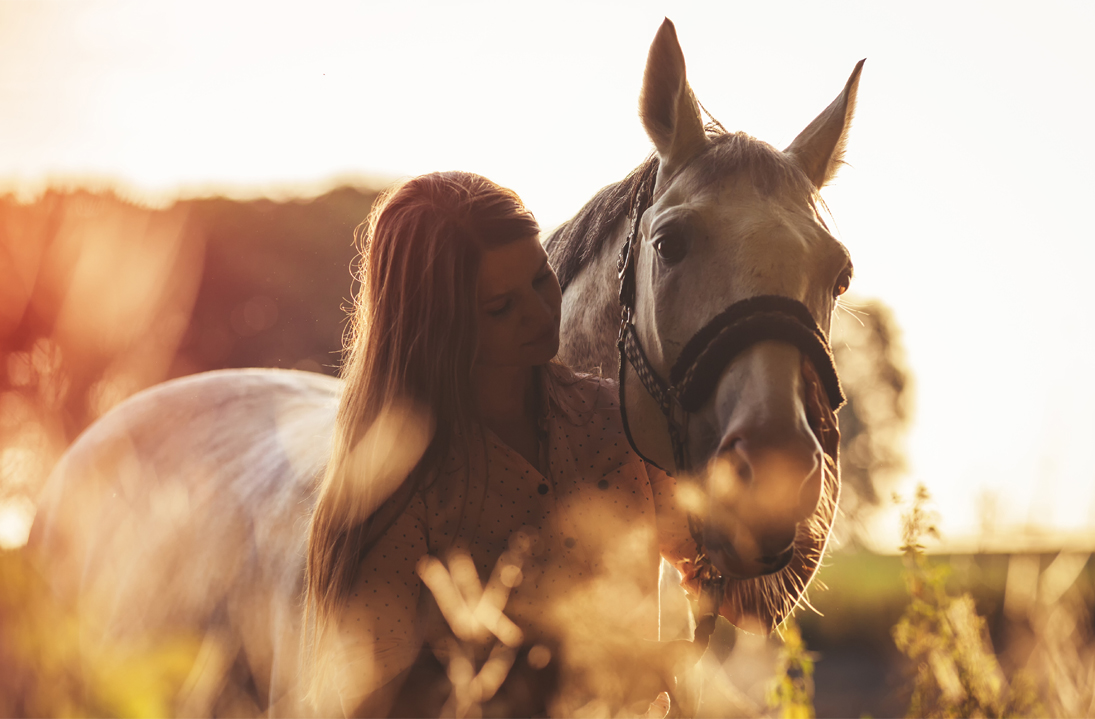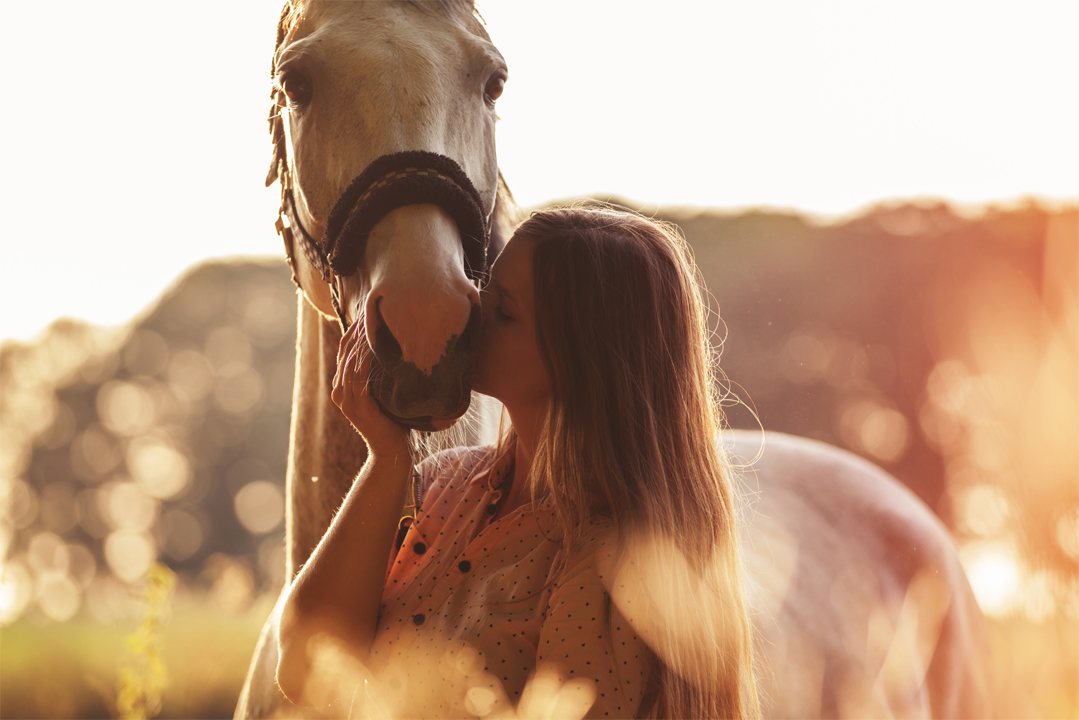Tools to quiet the chatter and find power in the moment
With the current chaotic state of the world, one topic getting attention is mindfulness and being present. But do we truly understand what cultivating presence means?
Sometimes, the best way to explain a subject is to discuss its opposite. It is not being out to dinner with friends (socially distanced), thinking about the webinar you are creating, ignoring them and missing out on true connection. It is not doing yoga and wondering what the holidays will look like this year. It is not spending time with your children while checking the latest news on your phone between sentences.
One clear way to know if you are present? Interact with a horse. Horses are thousand pound biofeedback mechanisms that will reflect your presence, or lack thereof. As prey animals, horses need to be present and aware, always, or else they could be lunch. And they expect that presence from their herdmates and humans- it makes them feel safe.
Earlier this week, a horse “told” me I wasn’t present. I was showing an Equus coaching client how she could interact with Sparrow, a horse. I invited Sparrow, who was not on a leadline, to follow me as I walked. Initially, I heard the beautiful sound of Sparrow’s hooves in the sand, right behind me. Then it was silent. I checked myself and realized that my focus had switched from the beautiful present moment to my worry about an upcoming business meeting. Sparrow was saying, in horse language, “You left, and I am no longer following

you, because you aren’t here.” Sparrow was reminding me to stop listening to the ever present, mindless chatter that can devour the present moment. Usually, like in the above case, that voice is a worrisome critic, telling us what we’ve done wrong and what will go wrong. Imagine, I was listening to my inner worries rather than being with Sparrow!
How often do we get stuck in our heads, hijacked by worries about our futures, jobs, finances, COVID, and other topics?
“Live the actual moment. Only this actual moment is life.” – Thich Nhat Hanh
Wouldn’t you love to live a life in which you no longer let your fears or worries take control of your thoughts?
So, what is being present, and what is the big deal about it? Being present is acknowledging the current moment and all its nuances. Right now, I am typing. I hear a crow squawking and an airplane flying overhead. I feel a slight breeze coming in through my window. I see my computer and a very messy desk. My brain is focused on thoughts regarding how to be present. I am truly present.
Traveling or being in a new environment is another great way of being present. With COVID, we can’t fly to Europe and practice mindfulness under the Eiffel Tower, but we can still drive our car to a pretty spot and take in the beauty around us. Roll down the window. What scents does the air carry? What do you see? A beach scene, the mountains, maybe just a parking lot where you can watch the trees move in the breeze. There, you have found a space of mindfulness.
Practice not worrying about the future or regretting the past. Those are the two things we will never change. In Eckhart Tolle’s bestselling book, The Power of Now: A Guide to Spiritual Enlightenment, he writes: “If your mind carries a heavy burden of the past, you will experience more of the same. The past perpetuates itself through a lack of presence. The quality of your consciousness at this moment is what shapes the future.”

Why does being present matter?
In December 2019, researchers at Brown University found that being mindful, or present, is associated with lowered blood pressure, improved gastrointestinal functioning, sharper thinking, and better sleep. Mindfulness is also linked to decreased anxiety and depression. UC Berkeley researcher Matthew Killingsworth, Ph.D., found that people are significantly less happy when their minds wander and when they are not present. This is true even when the content of the person’s thoughts is neutral. Wow, that’s enough incentive for us to hone my mindfulness skills.
Practice the following steps to increase your mindfulness
If you can devote 10 minutes a day to this practice, you will see a remarkable shift in your attitude in as little as 10 days:
1. Stop what you are doing and be still.
2. Tell the nonstop commentator in your head to take a break. You are going to focus on the present moment right now. For the rest of this exercise, if that chatter returns, let the thoughts glide out of your awareness, like a leaf flowing by in a stream. Don’t judge the thoughts or yourself for having them.
3. Take in a few deep breaths. Pay attention to your inhale, following your breath as it fills your lungs. Now exhale and again observe how you feel as the breath leaves your body.
4. Notice what you see. Take in the colors, the shapes, the movements. Watch for your mind making judgments. (In my earlier example, I noticed my messy desk but didn’t judge it. It’s just how I work.)
5. Now close your eyes (of course, only if safe to do so). Our sight can easily dominate our senses, so closing your eyes makes it easier to tune into your other senses.
- First, notice your feet on the ground. Are your feet on a cold, hard floor, a soft carpet, or the warm hard surface of the earth?
- What do you hear? Birds, the air conditioner, people talking, nothing? Just be aware of the sounds in your environment. Don’t judge.
- What does your skin feel? If you are outside, is it warm, can you feel the sun? Or is it shady, perhaps with a slight breeze?
- What do you smell? The fresh scent of redwoods, or a bland smell from your neighborhood?
You can do this exercise anywhere. I find it easiest to do within a natural environment, surrounded by redwoods or enjoying an ocean view. But I practice being present everywhere—a traffic jam, waiting in a doctor’s office, and especially when horseback riding. Mindfulness is a skill: the more you practice it, the better able you will be able to be present at any moment.The better you get at being mindful, the more you can use the calm feeling of being present to help you stay grounded during potentially stressful situations. The grande dame of wellness, Oprah Winfrey, says when you are mindful, “You are tuned in to the present moment instead of the jumble of thoughts in your head. You gain clarity. You stop giving power to your past. You know that, no matter what circumstances you find yourself in, you will be okay.” That sounds good to me.
Complimentary coaching sessions for Haute Living, San Francisco readers
Have a problem or issue that you’d like to discuss with Dr. Clark Ericson? Please send your question to nina@ninaclarkericson.com. If you’re chosen, Nina will contact you for a complimentary and confidential coaching session.
